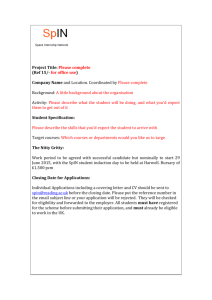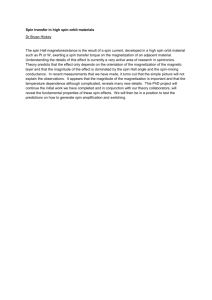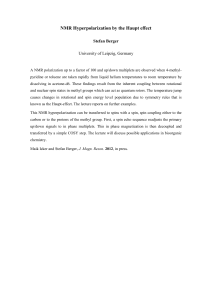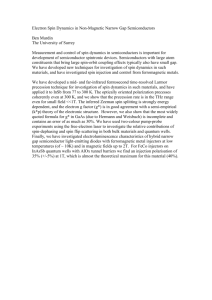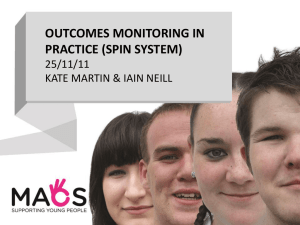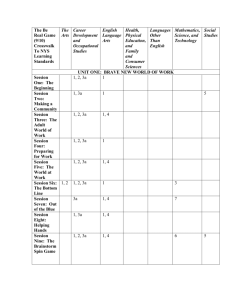Propaganda & Spin: Lesson Plan for High School Civics
advertisement
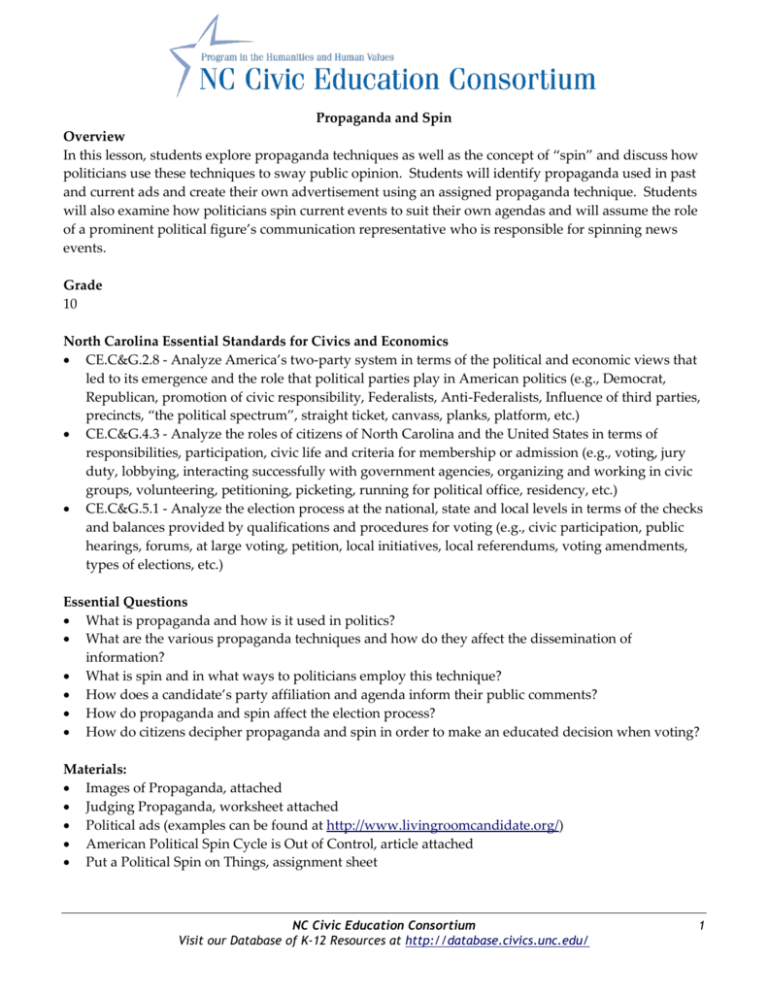
Propaganda and Spin Overview In this lesson, students explore propaganda techniques as well as the concept of “spin” and discuss how politicians use these techniques to sway public opinion. Students will identify propaganda used in past and current ads and create their own advertisement using an assigned propaganda technique. Students will also examine how politicians spin current events to suit their own agendas and will assume the role of a prominent political figure’s communication representative who is responsible for spinning news events. Grade 10 North Carolina Essential Standards for Civics and Economics CE.C&G.2.8 - Analyze America’s two-party system in terms of the political and economic views that led to its emergence and the role that political parties play in American politics (e.g., Democrat, Republican, promotion of civic responsibility, Federalists, Anti-Federalists, Influence of third parties, precincts, “the political spectrum”, straight ticket, canvass, planks, platform, etc.) CE.C&G.4.3 - Analyze the roles of citizens of North Carolina and the United States in terms of responsibilities, participation, civic life and criteria for membership or admission (e.g., voting, jury duty, lobbying, interacting successfully with government agencies, organizing and working in civic groups, volunteering, petitioning, picketing, running for political office, residency, etc.) CE.C&G.5.1 - Analyze the election process at the national, state and local levels in terms of the checks and balances provided by qualifications and procedures for voting (e.g., civic participation, public hearings, forums, at large voting, petition, local initiatives, local referendums, voting amendments, types of elections, etc.) Essential Questions What is propaganda and how is it used in politics? What are the various propaganda techniques and how do they affect the dissemination of information? What is spin and in what ways to politicians employ this technique? How does a candidate’s party affiliation and agenda inform their public comments? How do propaganda and spin affect the election process? How do citizens decipher propaganda and spin in order to make an educated decision when voting? Materials: Images of Propaganda, attached Judging Propaganda, worksheet attached Political ads (examples can be found at http://www.livingroomcandidate.org/) American Political Spin Cycle is Out of Control, article attached Put a Political Spin on Things, assignment sheet NC Civic Education Consortium Visit our Database of K-12 Resources at http://database.civics.unc.edu/ 1 Information on political figures; this can be accessed via internet sites such as http://ontheissues.org. If internet is not available for students, teachers can preselect political figures and print off information about them to provide to students. Internet access for additional research on political figures (optional) Spin Reflection Sheet, attached Homework assignment on spin, attached Duration Two 60 minute periods Procedure Day One Identifying Propaganda As a warm-up, write the word propaganda on the board and ask students to brainstorm what this word means, either in small groups or as a class. Encourage students to think about the definition, examples, situations in which it is used, etc. After the discussion, students should understand that propaganda refers to a type of message aimed at influencing opinions and/or the behavior of people. Propaganda may provide only partial information or be deliberately misleading. Propaganda techniques are often found on television and radio, as well as magazines and newspapers. Project the attached examples of propaganda and discuss with students: What do you think the purpose of this image is? Is this propaganda? Why or why not? If yes, which pieces of information regarding the subject of the image are not addressed? What might we learn about society based on this piece of propaganda? Focus on examples of propaganda by asking students what types of propaganda techniques they can name. Review or introduce the following: Emotional appeal (i.e. fear): Appealing to the emotions of your audience. For example, when a propagandist warns members of her audience that disaster will result if they do not follow a particular course of action, she is using fear appeal. Glittering generalities: A glittering generality device seeks to make us approve and accept without examining the evidence; Glittering generalities include phrases such as “We believe in”, “fight for”, and “live by virtue”. They also include words about which we have deep-set ideas, such as civilization, Christianity, good, proper, right, democracy, patriotism, motherhood, fatherhood, science, medicine, health, and love. Testimonials: Famous people or figures who will appear trustworthy speak to the audience Bandwagon: The basic theme of the band wagon appeal is that "everyone else is doing it, and so should you." Plain-folks: By using the plain-folks technique, speakers attempt to convince their audience that they, and their ideas, are "of the people.” Scientific approach: Using scientific jargon (i.e. numbers, statistics, data, etc.) to convince your audience Snob appeal: Giving the impression that people of wealth and prestige are on board Card stacking: Only presenting one side of the issue/situation NC Civic Education Consortium Visit our Database of K-12 Resources at http://database.civics.unc.edu/ 2 Transfer: Transfer is a device by which the propagandist carries over the authority, sanction, and prestige of something we respect and revere to something he would have us accept. Name-calling: The name-calling technique links a person, or idea, to a negative symbol. The propagandist who uses this technique hopes that the audience will reject the person or the idea on the basis of the negative symbol, instead of looking at the available evidence. Euphemisms: The propagandist attempts to pacify the audience in order to make an unpleasant reality more palatable. This is accomplished by using words that are bland and euphemistic. An example is during war time, since war is particularly unpleasant, military discourse is full of euphemisms. In the 1940's, America changed the name of the War Department to the Department of Defense. Place students into small groups and hand out the attached Kids Voting worksheet, Judging Propaganda. Have students complete the sheet in their groups then go over the answers as a class: 1. B 6. H 2. E 7. C 3. A 8. F 4. D 9. G 5. J 10. I Discuss: Why should we examine advertisements, campaigns, and various media forms in general for propaganda? Is propaganda a negative tactic in your opinion? Explain. o Discuss how persuasive techniques are regularly applied by politicians, advertisers, editorialists, radio personalities, and others who are interested in influencing human behavior. While propagandistic messages can be used to accomplish positive social ends, as in campaigns to reduce drunk driving, they are also used to win elections and to sell products. As technology increases, people are receiving hundreds of messages daily via Internet, TV, radio, news, etc. Thus, it is important we take the time to analyze what we are hearing/seeing to ensure we are finding the kernel of truth. Out of the types of propaganda from the worksheet, which do you think is most effective and why? Which do you think may be used to disguise truth the easiest? If possible, play examples of political ads for students to examine. (Teachers can record ads off of television, or search “political ads” on www.youtube.com for numerous examples. Many school districts block the use of You Tube; teachers might thus want to search for ads at home and download them for showing later. Another site to consult is the Center for Media and Democracy’s “Spin of the Day at http://www.prwatch.org/.) Choose several ads to play for students, asking them to note which of the propaganda techniques they see illustrated in each. Utilize a Propaganda Technique to Create an Advertisement Next, assign each group one of the propaganda techniques from the handout. Then, tell the groups to complete the following assignment: You have been assigned a particular propaganda technique. As a group, create an ad to present to class using this propaganda technique. You may create an ad for TV, an ad for the radio, or a visual ad (i.e. poster). NC Civic Education Consortium Visit our Database of K-12 Resources at http://database.civics.unc.edu/ 3 The purpose of the ad is to recruit votes for Jerimiah Jacobs, who is running for the North Carolina State Senate. You may be creative in the content you provide about Jerimiah, but it must be presented in a way that utilizes your propaganda technique. Be prepared to present your ad to the remainder of class in 15 minutes! Teacher note: If using this activity during an election time, you may want to assign students a real political figure to create an ad for. Students would then need to research facts about that figure and his/her political values and agenda so that their ad is realistic to the candidate while still utilizing the assigned propaganda technique. Once students are finished, have them present their ad to the reminder of class without sharing the propaganda technique they were assigned. After each presentation, instruct the rest of class to identify which technique the group utilized. Discuss: How did the ads for Jerimiah differ? Of all the ads you heard/saw today from classmates, which ad would make you most want to vote for Jerimiah and why? When politicians are campaigning during elections, in what ways do they utilize the techniques that you just used in your own ads? How do these propaganda techniques affect the election process? For homework, instruct students to bring in an example of propaganda. Students should examine magazines, the Internet, or watch TV and scan for examples then summarize the ad example on notebook paper, classify the type of propaganda used in the ad, and evaluate its effectiveness. (Ask students to bring in copies of the ads if possible.) Day 2 Exploring “Spin” As a warm-up, write the following on the board for students to read as they enter class: As of next month, all snack machines are being removed from school premises. Divide students into small groups and tell them to write a short blurb announcing this news in the school newspaper from the perspective of one of the following groups (group assignments can be repeated if you have a larger class): Group 1: School administrators who are tired of the snack machines getting knocked over and vandalized Group 2: Student health advocacy group called “Making Better Choices” Group 3: Student athletes, who raid the snack machines daily when starving after practice Group 4: 12th graders who can’t leave campus for lunch and despise the cafeteria food Group 5: Cheerleaders who have been advocating for low calorie and fat-free snacks to be put in the vending machines Group 6: The Booster Club, who has relied on the proceeds from the vending machine to fund athletics (i.e. new uniforms, improved football field, etc.) Give students 5-10 minutes to compile their news blurb then have each group share their blurb with class. Discuss: NC Civic Education Consortium Visit our Database of K-12 Resources at http://database.civics.unc.edu/ 4 In what ways did our blurbs differ? Even though we were all responding to the same topic, why did our blurbs differ? (They were told from people with differing perspectives and agendas) In what ways does this happen in the media today? Explain to students that when newsworthy events occur, politicians often utilize “spin”, which is a heavily biased portrayal in one's own favor of an event or situation. Politicians will provide their point of view or interpretation of the event in a way that is compatible with their own agenda in an effort to sway public opinion. While traditional public relations may also rely on creative presentation of the facts, "spin" often, though not always, implies disingenuous, deceptive and/or highly manipulative tactics. Politicians are often accused of spin by commentators and political opponents, when they produce a counter argument or position. Give students another scenario to report on, such as: This year, prom will not be held on the school premises. Rather than a DJ, a band has been hired to play. Ticket prices will cost $50 extra. Again, in their small groups, students will write a short blurb for their town’s paper regarding prom from their perspective: Group 1: Parent Prom Planning Committee, who likes the changes since they want to make the prom a very exclusive, high-class event in hopes of attracting wealthier families to the school system. Group 2: “Students for Students”, a student lead group who is concerned less wealthy students will not be able to attend prom due to the changes. Group 3: School administrators, who hope cut back on prom cost while charging more; this will create extra revenue for updating the library collection. Group 4: “ Rock Till’ You Drop”, the band that has been hired to play the prom. This is your first gig and you hope it will be the start of a big local career. Group 5: “DJ Jazzy Jake and Company”, the DJ who was not rehired to play this year’s prom. After a few minutes, again have students share their blurbs and discuss: How did news of the same event change when given by people with different agendas? Can you think of any events, either current or historical, that have been ‘spun’ by politicians? Is it ethical to spin a situation in one’s favor, or towards one’s own agenda? When dealing with politics, do you think it is possible to say something neutral about a political situation? Handout the attached opinion article American Political Spin Cycle is Out of Control . (While the article is from 2001, its subject maintains relevance.) After students have read, discuss as a class: Laura Weiss states, “What politicians write and say dizzies the public’s mind on a grand scale” and that spin has gotten “out of control.” Do you agree or disagree and why? How can political spin be deceiving? Why do you think Weiss calls the White House (regardless of the party in power) “America’s largest spin producing institution”? Who is responsible for uncovering the validity or underlying truth (if any) beneath spin? NC Civic Education Consortium Visit our Database of K-12 Resources at http://database.civics.unc.edu/ 5 Weiss says that the White House attempts to keep “scandalous news” from breaking on the TV. Is this a violation of freedom of the press in your opinion? Should there be limitations to what the press can report on? Explain. What can the public do regarding campaign spin? Practicing Political Spin Have students brainstorm recent events that have been in the local, national and/or international news that they think are very susceptible to spin. Then, divide the class into small groups, assigning each group a current political figure. Examples might include prominent members of government, presidential candidates (if during an election year), political pundits, etc. Give the group the attached assignment explanation, Put a Political Spin on Things. Go over the assignment sheet together, which explains to students that they are to imagine they are their assigned politician’s communications team. They must first research the views of the political figure assigned to them. Students will need computers with Internet access; sites such as http://ontheissues.org will help students understand the views and voting records of politicians. Otherwise, teachers can print information off and provide to students in handout form. Once students have familiarized themselves with the political figure, they are responsible for spinning a recent news event. (The example provided involves a conflict with Al Qaeda, but teachers can substitute the example for students to spin as they see fit.) Allow students to ask questions then instruct them to work on their statement. After groups are finished, bring everyone back together and give each student the attached Spin Reflection Sheet. Have each group present their work, first giving a summary of who they work for (the political figure assigned to them), their figure’s political party, and the figure’s views/political agenda. Then, groups should share their statements that have been prepared with spin. All students should take notes on their reflection sheet as they listen to each group’s presentation. After all student have presented, discuss: What were the major differences between the talking points of political figures? Did their party affiliation make a difference? Explain. What makes a successful “spin”? For any given event, is there a single truth about what happened or does it always depend on who is telling the story and how they tell it? Explain. Is spin deceitful in your opinion? Is it possible to eradicate spin? Explain. How does a candidate’s political agenda as connected to their party, and the way he/she communicates, shape our political system? Do you use spin when discussing events in your own life? If so, in what ways and why? If you were a politician, is there anything that you would consider to be off-limits to spin? Why or why not? As responsible citizens, how do we make an educated decision on which candidate to vote for when there is so much spin and propaganda at play? What questions do we need to ask ourselves when viewing, hearing, and reading campaign ads or candidate response blurbs? Assign the attached homework assignment in which students respond to Leon E. Panetta’s opinion of spin and how it is affecting America. NC Civic Education Consortium Visit our Database of K-12 Resources at http://database.civics.unc.edu/ 6 World War II Propaganda Posters NC Civic Education Consortium Visit our Database of K-12 Resources at http://database.civics.unc.edu/ 7 NC Civic Education Consortium Visit our Database of K-12 Resources at http://database.civics.unc.edu/ 8 NC Civic Education Consortium Visit our Database of K-12 Resources at http://database.civics.unc.edu/ 9 Political Spin Cycle Is Out of Control by Laura B. Weiss, The Daily Utah Chronicle, September 10, 2001 It’s here. It’s leached into the written and spoken words of our culture. It has invaded our television sets in the form of a sit com. It has even taken over an entire room at CNN. It’s spin—the practice of manipulating the facts to profit the politician and allay public concern. Political spinning comes naturally to humans. The first cave man, instead of going fishing for dinner, went into the forest and downed a few sweet nectars with his comrades. However, when he came back from the "river," the first cave woman did not banish him to the pre-historic doghouse. Why? He said he gave tonight’s catch (that was THIS big) to Igor in the next cave over. Igor, he explained, was too decrepit to fish. Now we all sigh—the first cave man was also the first philanthropist—or the first spin doctor. But who can blame him? Spin reserved him a warm place in the cave that night and maintained, if not improved, his image in the eyes of the first cave woman. The manipulation taking place on today’s political stage emulates this prehistoric narration. What politicians write and say dizzies the public’s mind on a grand scale. Spin, a practice that public- relation consultants use to control public perception, has, itself, gotten out of control. Case in point: the White House, America’s largest spin-producing institution. The venerated establishment plays generous host to a team of perception-savvy spin doctors. This public opinion posse performs damage control on subjects ranging from the administration’s fund-raising engagements and personal health to judicial appointments and love affairs. In his Aug. 9 address to the nation, President George W. Bush tried out his own hand at spinning, assuring the American people that "60 stem-cell lines" exist. These lines, he extolled, "have great promise." Purse your lips and furl your eyebrows, Mr. President, because science isn’t as easy to spin as you think—especially with the nation watching. On Aug. 17, solid objections emerged from the world’s largest (over 138,000 members) alliance of scientists. The American Association for the Advancement of Science called for Bush to immediately identify the 60 lines he claimed were available for federally funded research. Until this information is verified, the statement said, it is impossible to "assess the potential values of the cells for research and potential medical advances." Others aren’t swallowing Bush’s spin either. Several national figures, including Rep. Diana DeGette (D-Colo.) and Sen. Edward Kennedy (D-Mass.) have written letters to Health and Human Services Secretary Tommy Thomson and leaders at the National Institute of Health (NIH), respectively. DeGette outlined 10 questions on the specific condition and ownership of the stem-cell lines. Kennedy demanded a response from NIH regarding similar concerns. During Clinton’s presidency, spin-doctors made Olympian advances in evading the straight truth, "by chiding the press, browbeating reporters, referring inquiries to lawyers who will not comment or just plain changing the subject," said Washington Post media critic Howard Kurtz. Bush cannot eschew the stem cell 60 line conundrum with such anachronistic techniques. Even with an entire White House office—the Department of Communication—dedicated to producing and managing spin, Bush cannot evade the validity of scientists’ concerns. Until the existence of all 60 stem-cell lines is confirmed, it looks as if Bush has spun himself an excruciatingly tangled web. Spinning even its own moniker, the White House’s Department of Communication has been working double time over the past decade to develop new spin strategies. In this age of ever-proliferating peeping-Tom coverage, reporters climb over, drill holes through and generally destroy traditional reporting roadblocks. NC Civic Education Consortium Visit our Database of K-12 Resources at http://database.civics.unc.edu/ 10 However, the Spin Office, I mean, Communication Office, has developed fail-safe tactics that effectively keep the cork on news the White House doesn’t want reporters to use. For instance, White House spinners don’t allow scandalous stories to break on the television. By not confirming the validity of a story until the reporter’s deadline passes, press aids have almost complete reign over information. If reporters choose to air the story anyway, they risk their entire professional career. What’s unfortunate is that, for decades, the White House has lassoed typically trusted figures into their spin savvy corral. The White House has courted physicians in order to convince the public of the physical well being of our nation’s highest ranking representatives. For over a decade, Franklin Delano Roosevelt, with the aid of doctors and the secret service, spun his paralysis. The spin team masked the severity of FDR’s disability from millions of potential voters with deceptive statements about his health, in addition to tall podiums with camouflaged railings to create a mirage of FDR’s mobility. He relied, literally, on family and friends for support while approaching venues and posing for photographs. Unfortunately, spin-doctors have not done as well in concealing the severity of Vice President Dick Cheney’s health problems. Early in the presidential race, the Bush campaign provided the press with a well-edited report of Cheney’s medical history. However, some things—like three heart attacks before the age of fifty—just can’t successfully be spun. Nor can checking into a hospital for, what Bush described as "mild chest pains," but "not a heart attack.” He later retracted this statement, adding that it was a "very slight heart attack." The problem with our spin nation is this: In the process of our government telling the world white lies, we, as a society are not only frequently fooled by what we read but are also, albeit indirectly, sanctioned by the government to tell our own white lies. Spin teaches me that tax evasion is OK. When the Internal Revenue Service comes pounding at my door, all I’ve got to do is spin my story. Instead of admitting I didn’t pay taxes, I’ll just say I made a "very slight miscalculation." If slippery semantics work for our representatives in Washington, they work for me. When it comes to issues like the environment, the Communications Office needs, instead of glossing over the threatening global situation with 30-second news clips of the president dressed in natural tones helping forest rangers in Colorado, to give it to us straight. The president wants to break the environment and take it for a big business ride, and most of America knows that already. In a leaked White House memo, Environmental Protection Agency Administrator Christie Whitman offered her advice to President Bush on global warming, asserting, "we need to appear engaged." What a brilliant tactic—spin it like we care about the environment (instead of about poll numbers) then leave the earth to pillagers. Bush himself throws out vague, meaningless phrases when contemplating the subject. His recent best is: "I deeply care about the environment." In his stem-cell research address, he also used this ambiguous gem, professing to have "made the decision with great care." At this rate, perhaps Bush will begin to "deeply" and "greatly care" about the 42 percent (as calculated by “U.S. News and World Report”) of his time in office spent en route to or on vacation. Just try to spin that one. Source: http://media.www.dailyutahchronicle.com/media/storage/paper244/news/2001/09/10/Opinion/American.Political.Spin.Cycle.Is.Out.Of.Contr ol-91040.shtml NC Civic Education Consortium Visit our Database of K-12 Resources at http://database.civics.unc.edu/ 11 Put a Political Spin on Things! Your group has been hired as the communications team for the prominent political figure assigned to you. As new employees, you must first learn about the views and political agenda of your politician by reading the information provided. Pay close attention to this person’s political party, current and past positions, and his/her fundamental political beliefs, and/or agenda. Together, discuss and summarize this information and be prepared to present it to your classmates. Once you are familiar with this figure’s political perspective, your first public relations assignment is to comment on the ongoing war in Iraq from your politician’s perspective. Create a 5-10 sentence statement that “spins” the following situation in a way that encompasses your figures point of view and supports his/her political agenda: Five American soldiers were killed and nine were wounded in action during a battle with Al Qaeda in Baghdad yesterday. Remember, the spin you put on the statements you make to the press on behalf of your politician employer will effect his/her status in the public eye and could possibly affect his/her election or reelection. Thus, this affects your future employment! You will present your work to class in approximately 20 minutes. You must be prepared to give a summary of your assigned political figure (aka your current employer) and then share your spin statements. ------------------------------------------------------------------------------------------------------------------------------Put a Political Spin on Things! Your group has been hired as the communications team for the prominent political figure assigned to you. As new employees, you must first learn about the views and political agenda of your politician by reading the information provided. Pay close attention to this person’s political party, current and past positions, and his/her fundamental political beliefs, and/or agenda. Together, discuss and summarize this information and be prepared to present it to your classmates. Once you are familiar with this figure’s political perspective, your first public relations assignment is to comment on the ongoing war in Iraq from your politician’s perspective. Create a 5-10 sentence statement that “spins” the following situation in a way that encompasses your figures point of view and supports his/her political agenda: Five American soldiers were killed and nine were wounded in action during a battle with Al Qaeda in Baghdad yesterday. Remember, the spin you put on the statements you make to the press on behalf of your politician employer will effect his/her status in the public eye and could possibly affect his/her election or reelection. Thus, this affects your future employment! You will present your work to class in approximately 20 minutes. You must be prepared to give a summary of your assigned political figure (aka your current employer) and then share your spin statements. NC Civic Education Consortium Visit our Database of K-12 Resources at http://database.civics.unc.edu/ 12 Spin Reflection Chart Political Figure Party Affiliation Beliefs/Agenda Summary NC Civic Education Consortium Visit our Database of K-12 Resources at http://database.civics.unc.edu/ 13 Name: _________________________________ Homework Read the following excerpt from Leon Panetta’s article The Price of ‘Spin’ Versus the ‘Truth’ and answer the questions that follow. Huey Long—the infamous Louisiana politician of the Thirties—once promised a certain constituency in an election campaign that he would deliver a public works project to them if elected. When he failed to deliver the project after he was elected, he was asked why. His reply: "I lied!" Long's admission was brutally frank. It was the kind of honesty that worked well for Long. Why is it so difficult to work for many of those in public office today? The typical strategy is to tell people what consultants and pollsters say the public wants to hear and when the facts prove differently, to keep repeating the same words in the hope that repetition somehow will make it right. But there is a terrible price to be paid for this political "spin" game—the lost trust of the people… As our parents did, we try to teach our children to be truthful. Our very democracy is dependent on a strong relationship of trust between the people and their leaders. But in recent years, whether because of lost values or the ease and speed of modern communications, a bad example is being set for future generations by those who tell people the political message rather than what is really happening. This may provide some short-term political gains, but ultimately, the nation pays a terrible price. Huey Long decided to tell the simple truth when he said he lied in his campaign. It might just be that telling the simple truth can work to restore both our politics and our democracy. Lord knows, it's worth a try. From The Price of 'Spin' Versus the "Truth” by Leon E. Panetta, The Monterey County Herald, September 9, 2001 http://www.panettainstitute.org/Commentaries/090901.htm Respond with your thoughts below (use the back if necessary): 1. Panetta says, “…honesty…worked well for Long. Why is it so difficult to work for many of those in public office today?” Do you agree that many people in public office are dishonest? Why do you think public officials find it difficult to be honest? 2. Do you agree with Panetta when he says that due to the “spin game”, the people have lost trust in government and politics? Why? What evidence makes you think this? 3. Panetta also states, “…a bad message is being set for future generations by those who tell people the political message rather than what is really happening.” How do you interpret this comment? Do you agree or disagree? Explain. 4. “This [spin] may provide some short-term political gains, but ultimately, the nation pays a terrible price.” What price do you think Panetta is implying? NC Civic Education Consortium Visit our Database of K-12 Resources at http://database.civics.unc.edu/ 14
